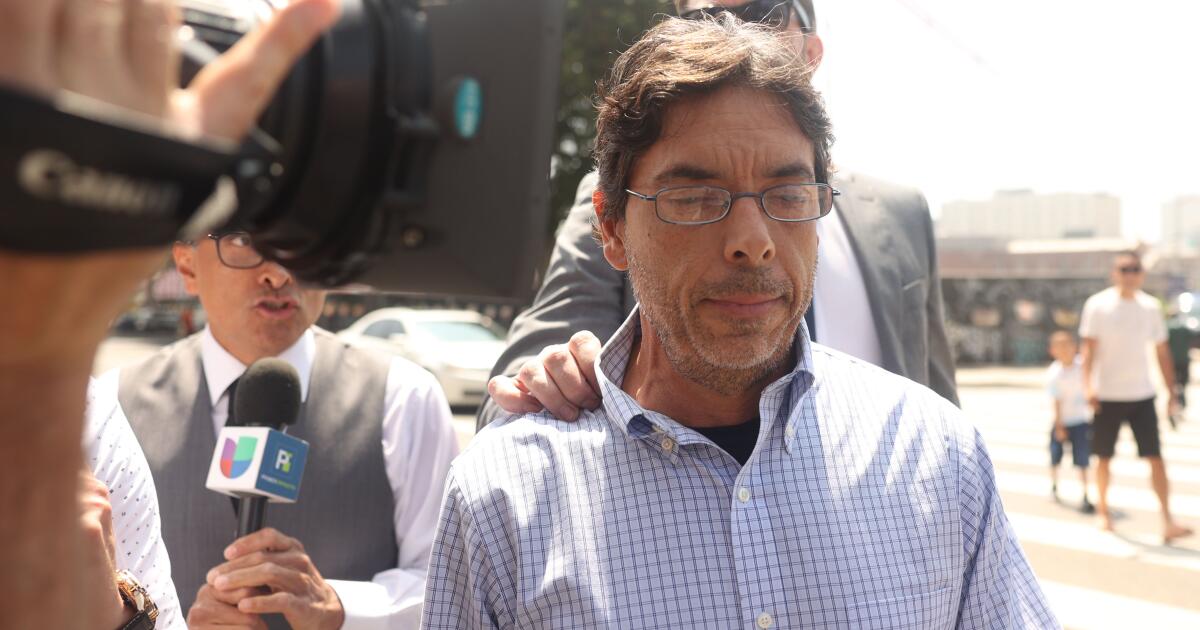

One of two doctors accused of providing ketamine to Matthew Perry pleaded guilty Wednesday to illegally distributing the surgical anesthetic.
Dr. Mark Chavez is among three defendants who signed a plea deal and face lesser charges in Perry’s death, which federal prosecutors have attributed to a conspiracy by multiple individuals to supply drugs to the actor.
The other two defendants who took plea deals are Perry’s personal assistant Kenneth Iwamasa and alleged drug dealer Erik Fleming.
Two other defendants are not cooperating with prosecutors and face far more serious conspiracy charges.
Jasveen Sangha, aka the “Ketamine Queen,” presented herself as “a famous drug dealer offering high-quality products,” according to court documents. She is accused of providing ketamine to Perry’s assistant. Dr. Salvador Plasencia, known as “Dr. P,” allegedly injected the actor with the drug at his Pacific Palisades home. Both have pleaded not guilty and are expected to go to trial in March.
During a brief appearance in a Los Angeles federal court on Wednesday, Chavez was asked how he was pleading and replied: “Guilty, your honor.” He is scheduled to be sentenced in April and faces up to 10 years in federal prison. As part of his plea, Chavez agreed to give up his medical license. He is free on $50,000 bail.
Perry, 54, was found dead in the hot tub of his Pacific Palisades home on October 28. He died from the “acute effects of ketamine,” according to the Los Angeles County medical examiner’s office. His death sparked a multi-agency federal investigation.
Last month, prosecutors revealed charges against what U.S. Attorney Martin Estrada called a “vast underground criminal network” that supplied the actor.
In late September, about a month before Perry’s death, prosecutors say, Plasencia learned that the actor wanted to obtain ketamine, a legal drug commonly used as an anesthetic, according to charging documents in the case.
Perry had taken the medication through his regular doctor as part of an unauthorized treatment for depression. But addicts use it recreationally, attracted by its dissociative effects.
After learning of Perry’s interest, Plasencia contacted Chavez, who previously ran a ketamine clinic, to obtain the drug to sell to the actor, authorities said. In text messages to Chavez, Plasencia discussed how much to charge Perry for the ketamine, stating, “I wonder how much this idiot is going to pay” and “Let’s find out,” according to court records. Doctors charged Perry $2,000 for a dose that cost Chavez $12, prosecutors say.
Chávez, as part of the plea agreement, admitted to diverting ketamine from his San Diego clinic to sell in Plasencia. Chavez admitted to lying to a drug distributor and submitting a prescription in a former patient’s name without his consent.
Chavez transferred 22 vials of ketamine and nine ketamine pellets, obtained fraudulently, to Plasencia to sell to Perry. Chavez “was fully aware that selling vials of ketamine to a patient for self-administration was illegal,” according to the plea agreement.
Plasencia, although barred by the Drug Enforcement Administration from prescribing controlled substances, continues to practice medicine but must notify patients of the ongoing criminal case.
Plasencia faces one count of conspiracy to distribute ketamine, seven counts of distribution of ketamine, and two counts of tampering and falsifying documents or records related to the investigation federal. If convicted, he faces 10 years for each ketamine-related charge and 20 years for each tampering charge.


